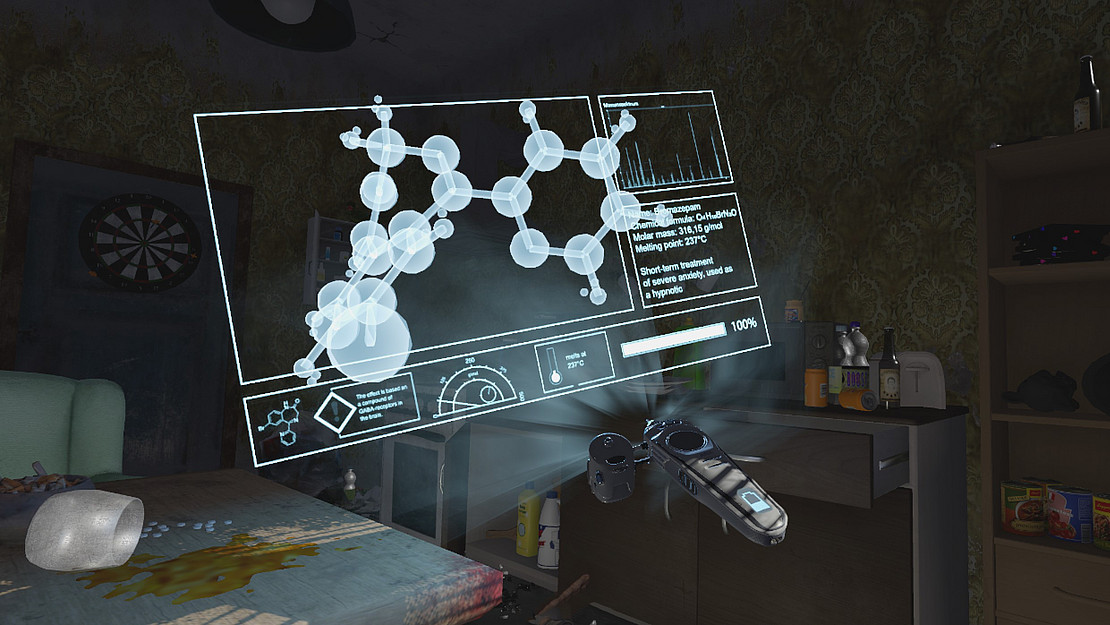This page contains automatically translated content.
Virtual Reality: Students develop computer games
 Image: Andreas Fischer
Image: Andreas FischerBut in what way are games designed for virtual reality glasses and the matching controllers fascinating? Is the experience really better than 3D cinema, and does using the controllers really make you feel like you're using your own hands? I want to know more and visit the Department of Electrical Engineering/Computer Science, where students are developing games in a seminar. As I put on my VR goggles, my excitement grows.
"Hello, my name is Mrs. Rothenstein." The image of a woman suddenly appears in my field of vision, lecturing and giving a brief insight about the game with a British accent, nickel glasses and a severe hairstyle. She explains how to use the controllers. My gaze swivels to the side and the previously dark gray background disappears. I find myself in the middle of a kitchen, literally standing in the table leg. To my left is the kitchen counter, straight ahead the window and heater, to my right the kitchen table and sofa. I only now notice the corpse next to the kitchen table. So I have been catapulted directly into a crime scene. Mrs. Rothenstein (played by Eva Keller) fades in. The question is: How did the man die? Only now do I realize how I've completely tuned out the surroundings. I have the feeling that I am standing right in this kitchen at this moment.
When I take off the VR glasses, I first have to reorient myself in the room. The game "Dead Herring" is the result of a cooperative seminar between the Department of Computer Science and the School of Art, and the virtual reality is so well implemented that the player forgets the real world and becomes immersed in it.
Interdisciplinary thinking and collaboration
The ideas are brought to the table by the students. "Most of them have to be slowed down a bit . Many students have ideas that would be feasible with 200 people in over two years, but not in the two semesters," says Simon-Lennert Raesch. He is a research associate at the University of Kassel's Computer Science and Electrical Engineering department in the Software Engineering Research Group. Raesch attended the seminar himself in 2011. He has been organizing and leading it since 2012, along with adjuncts from the art school.
"The goal of the seminar is not to teach students in-depth skills in game development. It's much more important to us that we teach interdisciplinary thinking and cooperation. Some former participants of the seminar say that the knowledge from the seminar helps them a lot. Being able to teach other people in an understandable way how game development works and what might not be feasible is incredibly beneficial," Raesch emphasizes. "And then it's also nice to see that we had two submissions for the German Computer Game Award this year."
Raesch presses an iPad into my hand and things get right underway. The iOS game SHI-RO is a puzzle / thinking game. Many bright colors and a quiet melody in the background are my first impressions. The explanation is simple, you have to connect circles and water drops in certain arrangements. After each completed part follows a Japanese drawing with historical explanations. The developers from the art school brought the idea from study trips from Japan .
My conclusion: Even without VR glasses, computer games remain exciting and allow everyday life to fade into the background for a moment. It doesn't matter if it's a game of skill or not, as a gamer you are completely elsewhere for the duration.
This article appeared in publik 1/2019 (March 20, 2019).
By Laura Li Stahr